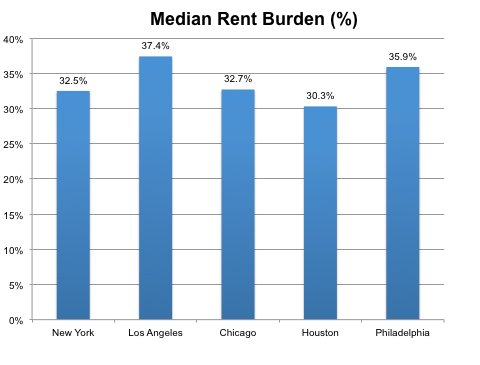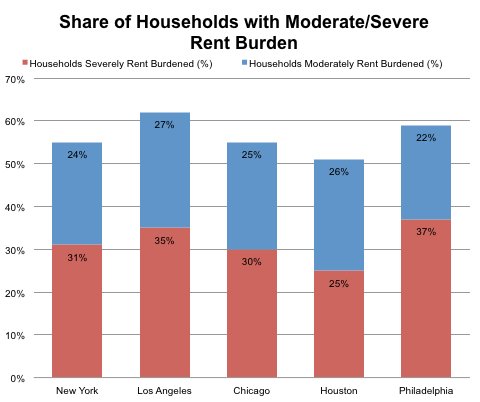
CATHERINE RAMPELL
Dollars to doughnuts.
In a magazine piece this week (and accompanying blog post), I talked about why many of the goods and services that high-income people consume are cheaper in New York — because it has such a large concentration of high-income people. I also mentioned that the big, glaring exception to this is housing, which is expensive for rich people as well as poor people.
So why is housing so expensive here, and getting even more so?
There are a few reasons. One is that New York has become a much more attractive place to live and work over the last few decades as crime has fallen and other amenities have improved. So demand for apartments here is up — and not just among people who live here full time.
“Manhattan and increasingly parts of Brooklyn are part of the global real estate market, attracting part-time people,” said Richard Florida, director of the Martin Prosperity Institute at the University of Toronto’s Rotman School of Management. “It’s similar to London in that way, where it’s not necessarily Londoners and New Yorkers buying and rent apartments. These are the two places where the global super-rich want to be.”
Joseph Gyourko, an economics professor at Wharton, adds that one incentive for the global super-rich to buy in New York, besides the proximity to world-class restaurants and entertainment, is that it may be a safe investment. “They may be buying to park money in a jurisdiction where they’re pretty sure it wouldn’t be expropriated,” he said. “If I were a Middle Eastern billionaire, you can bet I’d be parking a lot of money in New York.”
I asked N.Y.U.’s Furman Center for Real Estate and Urban Policy to look into whether the share of homes in New York that are not primary residences has risen in the last few years. It has:
In New York City over all, about 8.8 of every 1,000 housing units (or 0.88 percent) were for seasonal/recreational/occasional use in 2000, versus 18.8 out of 1,000 homes (1.88 percent) in 2011, the most recent year for which data are available. In Manhattan alone, the share of part-time units has nearly doubled over that same time, from 24.4 out of 1,000 (2.44 percent) in 2000 up to 48.1 out of 1,000 (4.81 percent) in 2011.
Those numbers may affect the high end of the sales market, which could potentially trickle down to everyone else, but the effect seems as if it should be relatively small given how small a share of housing is directly affected.
A second key reason that housing has become so expensive is that as demand for housing from both these occasional visitors and full-time residents has grown, supply has not kept up.
Housing in New York is tightly constrained, because of limited land to build upon plus lots of regulatory, building and zoning restrictions. Construction costs are very high. And the existing supply of housing is pretty inflexible, too. Right now, nearly half of the rental housing stock in New York City over all (as well as in Manhattan specifically) is rent-regulated, meaning the apartments are either rent-controlled or rent-stabilized. Another 17 percent of the rental housing stock across the city is public or subsidized (20 percent in Manhattan specifically).
A third key reason housing is so expensive, related to the first one I mentioned, is that a lot of amenities that wealthy people like are bundled into the price of an apartment in New York, including a high concentration of bars, restaurants and theaters, and a greater variety of high-end goods. Living in New York gives you access to a lot of perks that you would not have in lower-income places like Detroit, no matter how much you were willing to pay, and you’re paying for the cost of the entire bundle. For high-income people, who value these kinds of amenities, the cost is a bargain. The problem is that low-income people, for whom these perks are less important to the quality of life, cannot unbundle the cost of having a roof over their heads from the cost of being in close proximity to 66 Michelin-starred restaurants and the Metropolitan Opera.
New York offers higher salaries than most other cities, too, for both high-skilled and low-skilled people, which is another reason that housing costs are higher. High salaries and high housing costs are sort of mutually reinforcing: for high-skilled people, access to lucrative jobs nearby is baked into the cost of an apartment, and for low-skilled people, who are pinched by the higher cost of housing (and everything else they spend money on), better wages are required to convince them it’s worth staying and working here.
Given the better pay in New York, housing costs are actually less onerous than they might seem. The Furman Center crunched the numbers for rent burdens, or the share of household income that goes to paying the landlord. It’s about the same in New York as it is in the next four largest American cities.
 Source: Furman Center for Real Estate and Urban Policy analysis of American Community Survey (2011).
Source: Furman Center for Real Estate and Urban Policy analysis of American Community Survey (2011).
Likewise, the share of households that are moderately rent-burdened (meaning more than 30 percent of household incomes goes to rent) and severely rent-burdened (more than 50 percent to rent) is comparable with other cities.
 Source: Furman Center for Real Estate and Urban Policy analysis of American Community Survey (2011). Per definitions from the U.S. Department of Housing and Urban Development, a moderate rent burden is defined as spending more than 30 percent of household income on rent, and a severe burden is defined as spending more than 50 percent of household income on rent.
Source: Furman Center for Real Estate and Urban Policy analysis of American Community Survey (2011). Per definitions from the U.S. Department of Housing and Urban Development, a moderate rent burden is defined as spending more than 30 percent of household income on rent, and a severe burden is defined as spending more than 50 percent of household income on rent.
All that said, there are still some New Yorkers who feel strongly that rents are unreasonably high:
Article source: http://economix.blogs.nytimes.com/2013/04/26/why-the-rent-is-so-high-in-new-york/?partner=rss&emc=rss